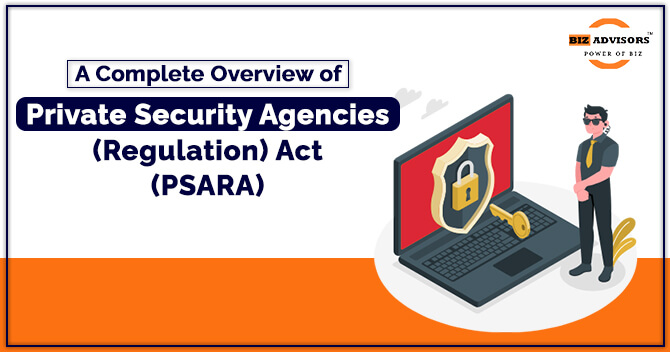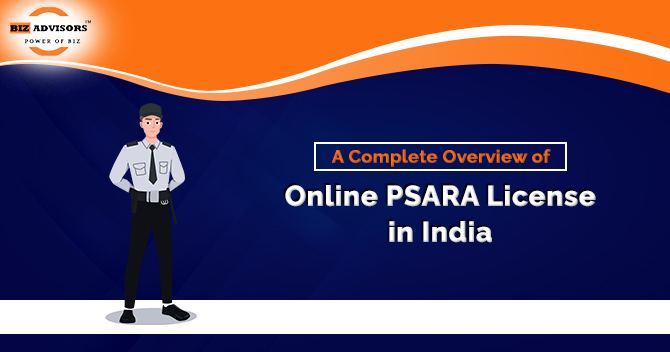The Private Security Agency Regulation Act (PSARA), introduced in 2005, was created to oversee and control the private security firms operating in the nation. The Act mainly addresses concerns with how these security services operate. The majority of these organizations didn’t do background checks on the people working as private security guards and managers. The Act aims to control different security agencies’ operations, requiring them to operate within a strict legal framework. Additionally, it would prevent them from impeding or interfering with police work, using weapons without a license, engaging in antisocial or criminal behavior, or donning clothing that resembles those of the police.
The state government in which the security agency is registered will have the authority to control its operations and may also create regulations for it. According to the Act’s rules, a private security agency license is not permitted to operate, open for business, or provide security guards without a license from PSARA. According to the Act’s provisions, these agencies must choose supervisors to direct the work of the subordinate security guards. The supervisors chosen often come from the army, navy, or air force with at least three years of service, or candidates from such a cadre are given precedence for the position. In this article, you will get to learn about the PSARA Act.
Advantages of the Private Security Agencies Regulation Act
The significant advantages of the PSARA Act are as follows:
1) Without obtaining a license under the Act, a private security company is not permitted to operate.
2) A private security company must meet the following requirements to be licensed:
The following situations prevent the applicant from getting a license:
· Convicted of a crime involving the establishment, development, or management of a business
· A person who has been convicted of a crime that has a minimum two-year prison sentence
· The person has affiliations with a legally prohibited group or association or has engaged in actions that compromise public safety or the rule of law.
· Because of their bad behavior or moral turpitude, they were fired or expelled from government service.
Furthermore, a firm cannot be granted a license if it is not registered in India or if its owner, a sizable portion of its shareholders, partners, or directors is not Indian citizens
3. Requirements for obtaining a license as a private security guard:
A person is ineligible to work as private security unless:
· Has completed the necessary training
· Is of good moral character
· Is at least 18 years old but not older than 65
· Is an Indian citizen or a citizen of any other country as defined by the Central Government
· Satisfies all other requirements listed in the Act
· Is physically fit as required by the Act
· Has not been convicted by a court of competent jurisdiction or dismissed or removed on the grounds of misconduct or moral turpitude.
People with military experience—including those who have served in the army, navy, air force, police, or home guards—will be given preference. The Private Security Agencies Regulation (Amendment) Act, 2019, established a Private Security Agency Licensing Portal that facilitates background checks, online licensing fee payments, and provisions for e-signing and geo-tagging to streamline the licensing procedure under the Act.
4. Training: The Act specifies that private security guards and supervisors must have proper training and possess certain abilities. A minimum of 100 hours must be spent in the classroom and 60 hours must be spent in the field.
What Does PSARA License Mean under the PSARA Act?
Below mentioned is the description of the PSARA License under the PSARA Act:
Section 2(c) of the Private Security Agencies (Regulation) Act defines the word “license.” The Act stipulates that to offer its services to individuals or organizations, a private security agency must get a PSARA license.
A PSARA License is only valid for five years following its issuance, as specified by Section 7(5) of the Act. After being granted a license, security companies must launch their operations within six months.
In Uttarakhand, Madhya Pradesh, and Chhattisgarh, however, this license is only good for a year.
The Act’s Section 8 discusses the license renewal process. By submitting a renewal application and the renewal cost 90 days before it expires, the license can be simply renewed after it has run out.
Essential Documentation concerning the PSARA License under the PSARA Act
The list of the required paperwork for the PSARA license under the PSARA Act is as follows:
· PAN
· Details of the GST forms ESI and EPF
· Documents attesting to the company’s registration under the Shops & Establishments Act Labor license
· MSME Registration & SME Registration
· Security Training Certification from SKSDC or DGR
· Proof of the business’s ownership
· A LOGO for the organization
· Identity cards for the staff
· Associations with nominated bodies by the controlling authority
· Hospital affiliations
· Information about each employee
· Arm Permits
· Employee character checks
· Employee training certificate
· A uniform pattern featuring four postcard-size images of the uniform, headgear, insignia, and other accessories
The affidavit must be attested by an Executive Magistrate, and all other documents must be attested by a public notary.
How to Apply for a PSARA License under the PSARA Act?
Following is the procedure for obtaining a PSARA License under the PSARA Act:
· Assemble the paperwork needed to get a PSARA License MOU: A Memorandum of Understanding (MOU) with a training facility that has government authorization. To train its security officers and supervisors, the applicant must sign an MOU with a government-authorized training facility.
· Verification by the police: The applicant must submit Form-I to request a police verification.
· PSARA application submission: Register for the PSARA[1] controlling authority, which is present in each state. (The application won’t be handled unless the relevant police authority issues a NOC).
· PSARA License: After confirming the information, the Authority will either issue a PSARA license or reject the application with a good reason.
Recent changes to the PSARA Act
The Private Security Agencies Regulation (Amendment) Act of 2019 created a Private Security Agency Licensing Portal that simplifies background checks, online licensing fee payments, and capabilities for e-signing and geo-tagging to speed up the licensing process under the Act.
Conclusion – Private Security Agencies Regulation Act
The private security industry (PSI) is expanding at an ever-increasing rate and continues to rule people’s public and private places, thus the center passed the Private Security Agencies (Regulation) Act of 2005. The major purpose of the legislation is to keep an eye on these organizations’ operations and prevent them from interfering with the country’s system for upholding law and order. How security guards will be hired and how security organizations will operate are both spelled out in the Act. Additionally, it outlines the requirements for obtaining a license, how to apply for one, the terms of use, and how supervisors are chosen. You can freely contact our legal experts at BizAdvisors.io for any kind of professional assistance concerning the PSARA Act.
Read our article:How to Apply for Online PSARA License in India
 9559179325
9559179325 9559179325
9559179325





